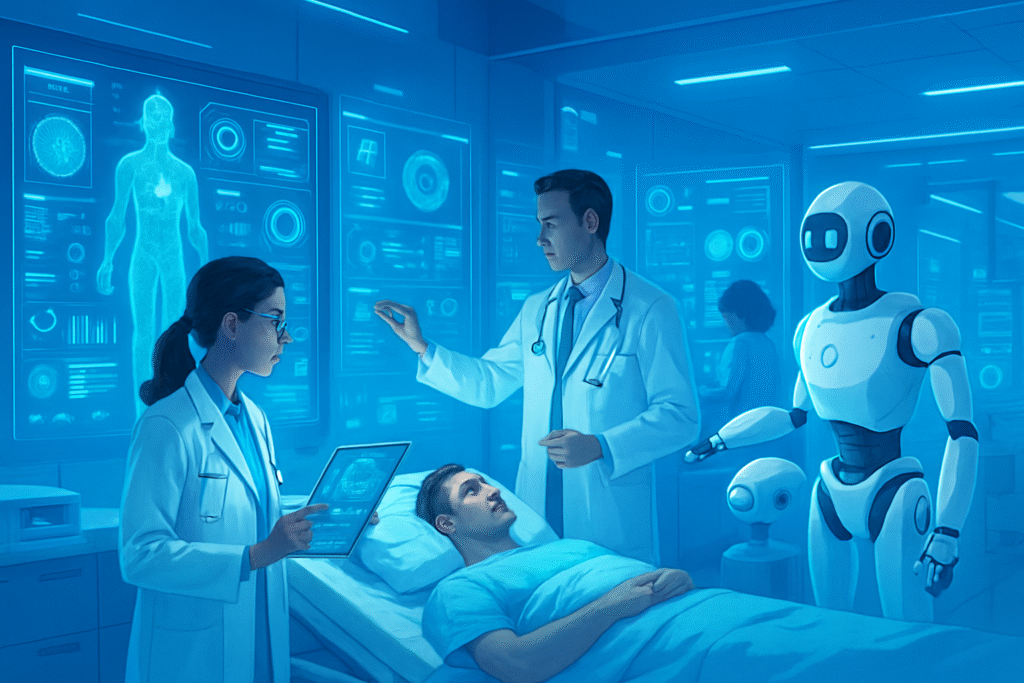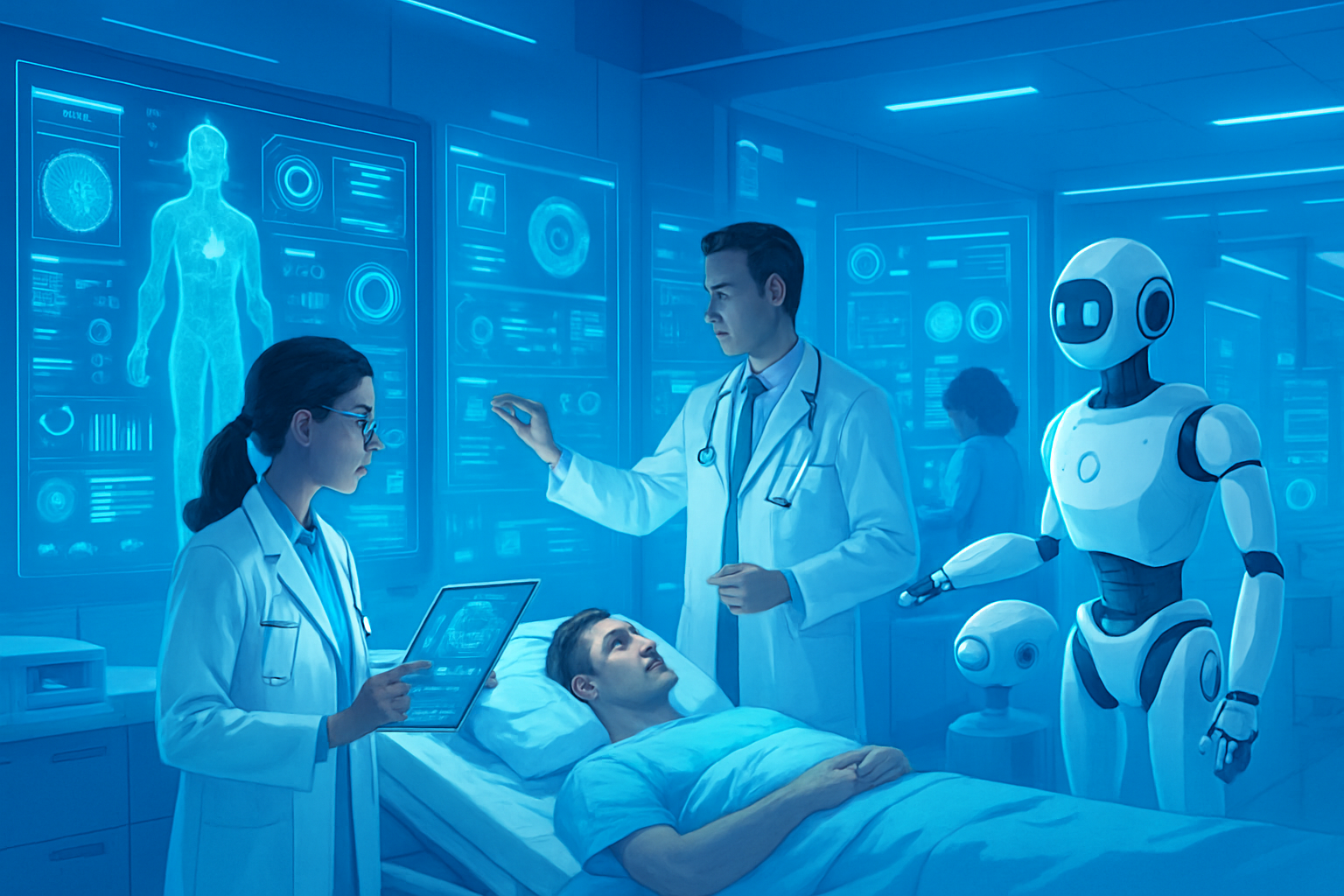
Artificial Intelligence (AI) is on the brink of revolutionizing various sectors, but nowhere is its impact more pronounced than in healthcare. As the industry faces chronic challenges, AI offers innovative solutions that promise to improve patient outcomes and streamline processes. This article delves deep into how AI is transforming industries—particularly healthcare—and what this means for the future of medical practice and patient care.
From predictive analytics to advanced diagnostics, AI technologies are reshaping how healthcare professionals approach patient treatment and disease management. By leveraging advanced algorithms and machine learning techniques, healthcare providers can make better-informed decisions that not only enhance service delivery but also improve the efficiency of healthcare systems worldwide.
Revolutionizing Diagnosis: The Role of AI in Early Detection
One of the most significant ways AI is transforming healthcare is through enhanced diagnostic accuracy. Traditional diagnostic methods can sometimes lead to human error, which may delay treatment or result in misdiagnoses. AI algorithms can process vast amounts of medical data far quicker than any human, enabling healthcare providers to detect conditions such as cancers, cardiac diseases, and rare genetic disorders at earlier stages. Using image recognition technology, AI-enabled tools can analyze medical imagery—like X-rays, MRIs, and CT scans—more accurately than some experienced radiologists.
Moreover, AI can continuously learn from new data, improving its diagnostic capabilities over time. For instance, deep learning networks trained on thousands of historical case studies can identify patterns in diseases that may not be apparent to human experts. By offering insights derived from comprehensive data analyses, these AI systems can empower doctors to make timely and clinically sound decisions that ultimately save lives.
AI-Driven Personalized Treatment Plans
Another way AI is revolutionizing healthcare is through the development of personalized treatment plans. Traditionally, treatment protocols were often standardized, failing to cater to individual patient needs. However, with AI, healthcare providers can analyze data about a patient’s genetic makeup, lifestyle, and medical history to tailor treatment that best suits their specific conditions.
Machine learning models can evaluate the effectiveness of various treatment options based on similar patient profiles. With this data-driven approach, healthcare professionals can predict how a patient will respond to certain medications or therapies, thereby minimizing trial-and-error periods that can be both costly and detrimental to patient health. This level of customization not only leads to improved outcomes but also enhances patient satisfaction, as individuals feel more involved in their treatment process.
Additionally, AI can help monitor how patients are responding to their treatment plans in real-time. Wearable devices equipped with AI algorithms can track vital signs and other health parameters, alerting healthcare providers if adjustments are necessary. This later stage of treatment management can be crucial for chronic illnesses, where ongoing monitoring is required to ensure the best possible outcomes.
Streamlining Administrative Operations Through Automation
While patient care is at the forefront, AI’s impact on the healthcare sector extends to administrative operations as well. The overwhelming amount of paperwork and bureaucratic processes can bog down healthcare systems, often leading to inefficiencies and burnout among medical staff. AI-driven automation aids in streamlining these processes, allowing healthcare professionals to focus more on patient care rather than administrative duties.
For example, AI technologies can automate appointment scheduling, billing tasks, and insurance claims processing. By utilizing natural language processing, AI chatbots can handle routine inquiries from patients, freeing up human staff to deal with more complicated queries. This not only enhances operational efficiency but also improves patient experiences by providing instant responses to their needs.
Furthermore, AI tools can help in managing resource allocations more effectively in hospitals and clinics. Predictive analytics, driven by AI, can forecast patient admission rates, which aids in staffing decisions and resource management. This optimization results in a better-organized healthcare environment, enhancing service delivery and minimizing wait times.
Enhancing Drug Discovery and Development
The process of drug discovery and development is notoriously complex and time-consuming. Traditionally, it can take years of research and billions of dollars invested before a drug reaches the market. However, AI is paving the way for a more efficient paradigm. By speeding up the data analysis phase, AI can identify potential drug candidates and predict their efficacy much faster than conventional methods.
AI algorithms can analyze vast datasets, including clinical studies, scientific literature, and even previous trial results, to spot promising molecular structures that could lead to new medications. Additionally, machine learning models can refine the testing phase by identifying optimal dosing regimens and predicting adverse reactions, which can drastically cut down the time it takes to get new drugs approved.
This means that novel therapies can be developed quicker and more economically, addressing urgent medical needs and allowing pharmaceutical companies to be responsive to emerging health crises. As AI continues to mature, we may very well see an exponential increase in the speed and efficacy of drug development in the coming years.
The Ethical Considerations in AI-Driven Healthcare
Despite the numerous benefits, the integration of AI into healthcare does warrant serious ethical considerations. Issues surrounding data privacy, algorithm bias, and accountability are paramount in discussions about using AI technologies in medical settings. Patient data security is of utmost importance, and robust measures must be implemented to protect sensitive information. As the reliance on AI for diagnosis and treatment plans increases, so too does the need for stringent regulatory oversight.
Another significant concern is algorithm bias, where AI systems trained on non-representative datasets may produce skewed outcomes. Healthcare equity is essential, and it is crucial to ensure that AI-driven systems are designed with inclusivity in mind to serve a diverse population effectively. Continuous monitoring of AI tools is necessary to identify bias and ensure fairness in healthcare delivery.
As we embrace AI’s promising potential, it is vital for stakeholders in the healthcare system—including providers, policymakers, and technology developers—to engage in open dialogues surrounding these ethical challenges. Collaborations can lead to establishing guidelines that ensure the technology enhances healthcare rather than undermines it.
Conclusion: The Future is Here
Artificial Intelligence is a powerful player in the transformation of the healthcare industry, providing tools that enhance patient care, streamline operations, and redefine the patient experience. From fostering early diagnostics to creating personalized treatment plans, the potential benefits are vast and varied. However, with innovation comes responsibility. Ethical considerations must be addressed to ensure that the advantages of AI are accessible to all.
In summary, as AI continues to evolve and integrate within healthcare frameworks, the prospect for a future characterized by greater efficiency and improved patient outcomes appears promising. By treating patients as unique individuals rather than mere data points, AI has the potential to truly revolutionize healthcare, setting the stage for advancements that we have yet to fully comprehend.
FAQs
1. How is AI currently being used in healthcare?
AI is being utilized in various ways, including diagnostic imaging, personalized treatment plans, administrative automation, and drug discovery. By analyzing vast datasets, AI helps improve patient outcomes and streamline workflows.
2. What are the benefits of using AI in diagnostics?
The primary benefits of using AI in diagnostics include increased accuracy, early detection of illnesses, and enhanced efficiency in medical imaging analysis. AI can evaluate medical data faster and with greater precision than traditional methods.
3. What ethical concerns should be considered with AI in healthcare?
Key ethical concerns include data privacy, algorithm bias, and the accountability of AI systems. It’s crucial to ensure patient data is secured and AI systems are transparent and equitable in their deployment.
4. Can AI improve patient experience in healthcare?
Yes, AI can enhance patient experience by streamlining administrative processes, providing personalized treatment options, and ensuring timely responses to patient inquiries through automation. This leads to a more satisfying healthcare journey.
5. What is the future of AI in healthcare?
The future of AI in healthcare looks promising, with ongoing advancements in technology projected to lead to improved diagnostics, quicker drug development, and better patient management. Continued dialogue on ethics will ensure the benefits are realized responsibly.




